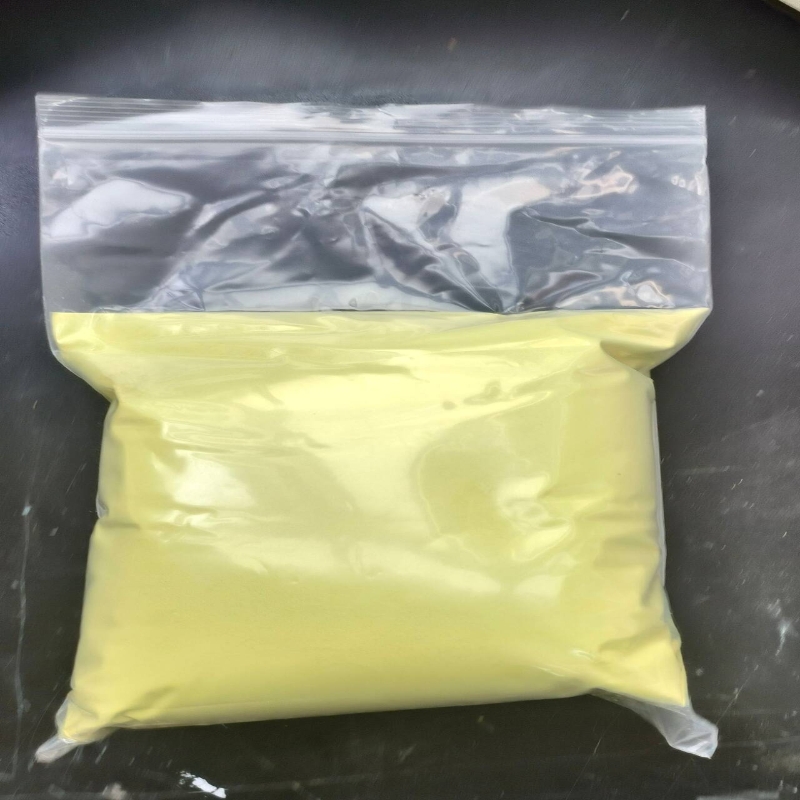CSCO Releases Guide to Non-Small Cell Lung Cancer 2020 4 New PD-1/L1 Drugs Recommended
-
Last Update: 2020-05-28
-
Source: Internet
-
Author: User
Search more information of high quality chemicals, good prices and reliable suppliers, visit
www.echemi.com
Source: Pharmaceutical Mission Hillsrecently, the Chinese Society of Clinical Oncology (CSCO) published online "Non-small cell lung cancer diagnosis and treatment guidelines 2020" (hereinafter referred to as the Guide)Immunotherapy is one of the highlights of this Update to the Guide, and several high-weight innovative drugs are recommended for first- and second-line treatments for non-small cell lung cancer (NSCLC), including PD-1 inhibitors Carreli-Zandu and Pablo-Pearl monoantigen, PD-L1 inhibitors Dvalaliu monoantigen and attali-pearl monoantigenthe incidence and fatality rate of lung cancer is the highest in the world and China, of which NSCLC accounted for 85% of the total lung cancer, most of which was advanced at the time of initial diagnosisFortunately, late-stage NSCLC is a hot field of anti-tumor new drug research and development in recent years, there are many innovative drugs, and a number of immunotherapy has been approved for the marketCarreli Pearl Monoantia is a humanized PD-1 monoclonal antibody developed by Hengrui Pharmaceuticals and with intellectual property rightsApproved for market ingression in China in 2019, it is currently approved for recurrent/incurable Hodgkin's lymphoma and advanced hepatocellular carcinomaThe new Guide recommends the addition of "Carrelli Bead monoantigen combined pemephore and platinum (class 1A evidence) for phase IV first-line treatment of non-drive genes and non-scale NSCLC."According to the results of SHR-1210-III-303 (CameL study), the treatment of late non-scaly NSCLC patients with carragedon mono-anti-combination chemotherapy (pemelic and caplatinum) can significantly extend progression-free survival (113 months vs 8.3 months), meanwhile, the combined therapy group ORR (60.0% vs 39.1%), DCR (87.3% vs 74.4%), DoR (17.6 months vs 9.9 months) and median OS (not reached vs 20.9 months) were better than the chemotherapy group aloneThis study data also provides accurate guidance for the clinical practice of NSCLC in ChinaPembrolizumab, a new drug for heavy PD-1 antibodies in Mersadon (MSD), was approved for use in melanoma in China in July 2018, becoming the first PD-1 antibody to be approved for use in ChinaIn 2019, the drug will receive three adaptations to non-small cell lung cancer in ChinaThey are: 1Linked to pemere and platinum chemotherapy, first-line treatment of EGFR/ALK-negative metastatic non-small cell lung cancer; 2for PD-L1-positive (-1%), EGFR/ALK-negative local advanced or metastatic non-small cell lung cancer single-line treatment; 3in combination with carp and sequoia alcohol, first-line treatment for metastatic squamous non-small cellwon three first-line treatments for non-small cell lung cancer in a year, paoli Zhu single anti-resistance has become one of the most important treatments for lung cancer patients in ChinaIn the new Guide, Pablo Pearl Santi received the cSCO 4 highest level (I.) recommendationSpecific ally as follows:Guide for phase IV non-drive gene, non-scale NSCLC first-line treatment, the addition of Paboli beads monoantigen first-line treatment PD-L1 TPS 50% of patients (1A evidence) and PD-L1 TPS 1%-49% of patients (2A evidence) I-grade recommendation, while adding Paboli pearl mono-anti-combined meldonator and i-grade treatment as a recommended level I treatmentAccording to keynote-042 China studies, 262 Patients with PD-L1-positive (tumor ratio score TPS-1%) from China completed the groupOf these, 146 patients (55.7%) had PD-L1 TPS of 50% and 204 patients (77.9%) of PD-L1 TPS was 20%The results showed that the Pabolizumab improved the patient's OS compared to chemotherapy for patients with PD-L1 TPS of 50%, 20% and 1% (see table above)In the population of patients with TPS of 1% to 49%, the improvement in total survival of Pablo Zumai is also better than chemotherapy (19.9 vs 10.7)Compared with global data, The efficacy of PD-L1 TPS in Chinese patients with PD-L1 TPS was consistent, while the Chinese group data were better and significantly better than chemotherapy for PD-L1 TPS 1% to 49% of patientsThe Recommendation of Paboli-Zuma mono-combination chemotherapy is based on keynote-189 studiesThe latest results show that, regardless of PD-L1 expression levels, the combination of Pablozumab and monoantigen therapy significantly improved OS and PFS in patientsSpecifically, the median OS in the Paboli beaded mono-anti-combined pemexe/platinum group was 22.0 months (10.7 months in the placebo group), the estimated 24-month OS rate was 45.5% (vs 29.9%), the median PFS was 9.0 months (vs 4.9 months), and the estimated 24-month PFS rate was 20.5% (vs 1.5%)for the first-line treatment of patients with stage IV driverless genes and squamous cancer, the Guide adds Paboli Pearl single anti-monotherapy pD-L1 TPS to 50% of patients (1A evidence) and PD-L1 TPS 1-49% of patients (2A evidence) as the I-recommendedAt the same time, the addition of Paboli beads mono-anti-combined yew alcohol/albumin yew alcohol and platinum (class 1A evidence) is recommended for Class IAccording to the latest results from the KEYNOTE-407 study, the Pablo zuma-mono-combination chemotherapy group significantly improved OS and PFS compared to pure chemotherapyOf these, mOS was 17.1 months (11.6 months in the placebo group) and mPFS was 8.0 months (vs 5.1 months), without regard to the level of PD-L1 expression The results of the study were consistent with global results, with mOS at 17.3 months (vs 12.6 months) and mPFS at 8.3 months (vs 4.2 months) Durvalumab, a PD-L1 immuno-checkpoint inhibitor owned by AstraZeneca, was approved for listing in China late last year based on THE PACIFIC study Became China's first PD-L1 antibody In the latest edition of the Guide, for patients with local late stage and drive gene negative, and non-surgical IIIA, IIIB, IIIC NSCLC, Duvaliyu monoantigen "as a consolidation therapy after synchronous chemotherapy (class 1A evidence)" was recommended from Level III to Level I recommendation PACIFIC study is a phase 3, randomized, double-blind, placebo-controlled international multicenter clinical study designed to evaluate the efficacy and safety of patients with phase III non-rectructable NSCLC after receiving the standard platinum-containing CPSC as a consolidation therapy In the study, the Dawariu monoantigen group and the placebo group were in groups of 476 and 237 patients, respectively results showed that, in contrast to the placebo group, the median PFS significantly increased by about 11.6 months (17.2 months vs 5.6 months) Total survival time (OS) was also significantly extended, with the median OS in the novi-far-resistant placebo group not reaching (NR) and 29.1 months, respectively In addition, dwarview mono-anti-maintenance therapy can be significantly extended to the time of death or distant rotation (28.3 months vs 16.2 months) Subgroup analysis observed similar results atezolizumab, roche's PD-L1 inhibitor, was approved by the U.S FDA for single-drug first-line treatment of metastatic non-small cell lung cancer (NSCLC) adult patients with single-drug first-line therapy for High Expression of PD-L1, whose tumors do not carry EGFR or ALK gene variants In China, atili-Zuma was approved in February this year for combination chemotherapy for first-line treatment of a wide range of small cell lung cancer; Guide for phase IV no-drive gene, non-scale NSCLC first-line treatment, II-level recommended the addition of "purple fir alcohol , caplatinum , beva beads mono-resistance , attili-bead monoantigen (1A class evidence) " and "albumin yew alcohol plus caplatinum and attalibed monoantigen (1A class evidence) " For stage IV non-drive gene, non-squamous cancer/squamous cancer NSCLC second-line treatment, Grade II recommended the addition of attalizumab monoantigen therapy (Class 1A evidence) based on the IMpower150 study, aims to explore the efficacy and safety of PD-L1 mono-athanoad-resistant combination chemotherapy (caplatinum and yew alcohol) and non-combined bebabelimono therapy for first-line therapy for late-stage non-scale NSCLC The patients were randomly divided into 3 groups: attili beads mono-anti-and bebabeads-resistant-ka-platinum-caspaol (ABCP group), at-price-beads-single-resistant to-card-sequoia (ACP group), and beva-pearl mono-resistant to ca-platinum-casmy ol (BCP group) The latest data show that ABCP combination therapy benefited more from OS in the wild-type intent therapy (ITT-WT) patient population, reducing the risk of death by 22% compared to BCP therapy, and 19.5 months of mOS in the ABCP group, significantly better than the 14.7 months in the BCP group it is learned that the CSCO guidelines on drug recommendations are divided into I-level recommendations, II-level recommendations and III-level recommendations three levels Among them, I grade recommendation is the highest level, with the following characteristics: accessibility of universal treatment measures (including clear adaptation certificate), the value of tumor treatment is relatively stable, basically included in the national health insurance; (Original title: 4 PD-1/L1 heavy-weight new drugs recommended!) 2020 CSCO Guidelines for The Diagnosis and Treatment of Non-Small Cell Lung Cancer)
This article is an English version of an article which is originally in the Chinese language on echemi.com and is provided for information purposes only.
This website makes no representation or warranty of any kind, either expressed or implied, as to the accuracy, completeness ownership or reliability of
the article or any translations thereof. If you have any concerns or complaints relating to the article, please send an email, providing a detailed
description of the concern or complaint, to
service@echemi.com. A staff member will contact you within 5 working days. Once verified, infringing content
will be removed immediately.




![2-(Hydroxymethyl)benzo[b]thiophene](https://file.echemi.com/fileManage/upload/cas/593/e79a972f-b55d-4dc1-9113-841c417e0a89.png)


